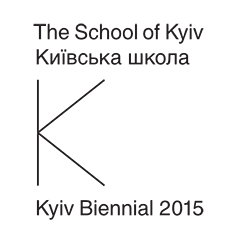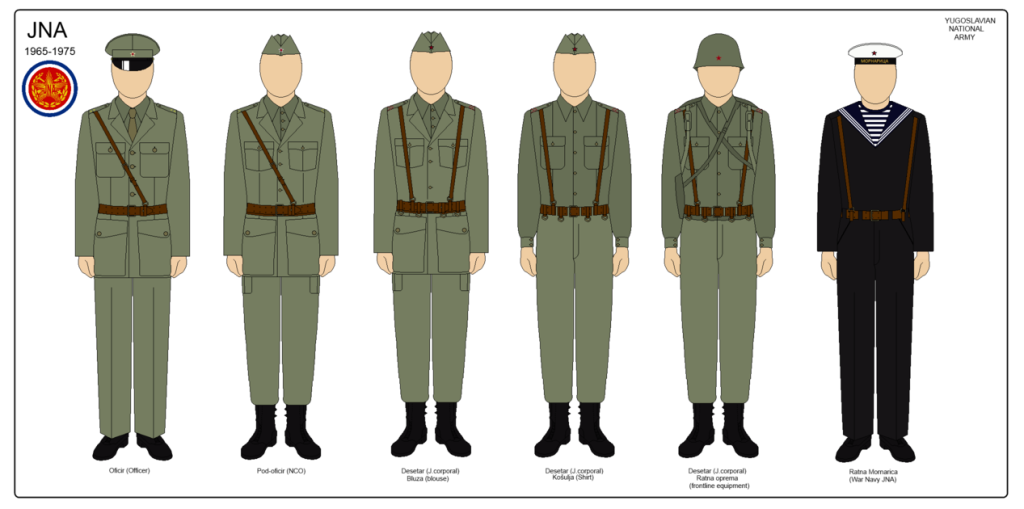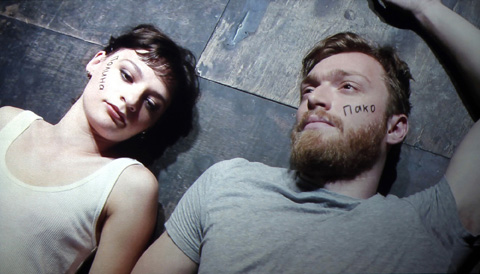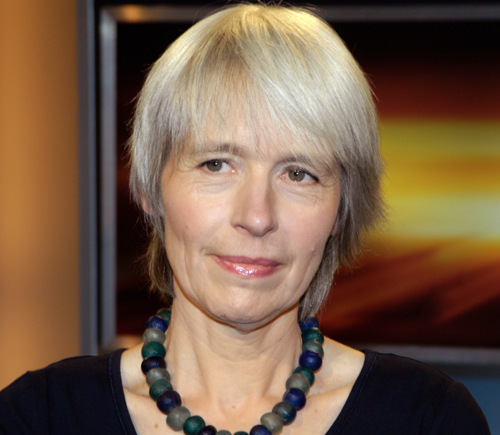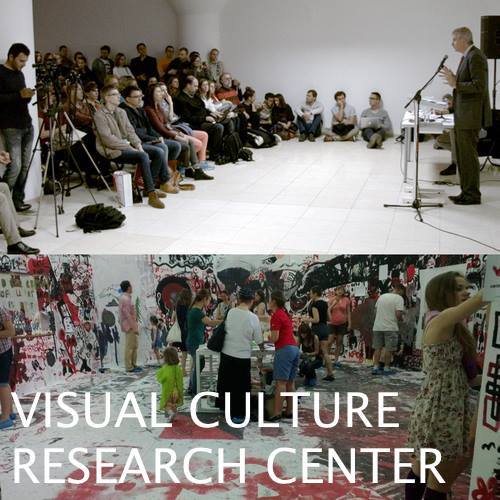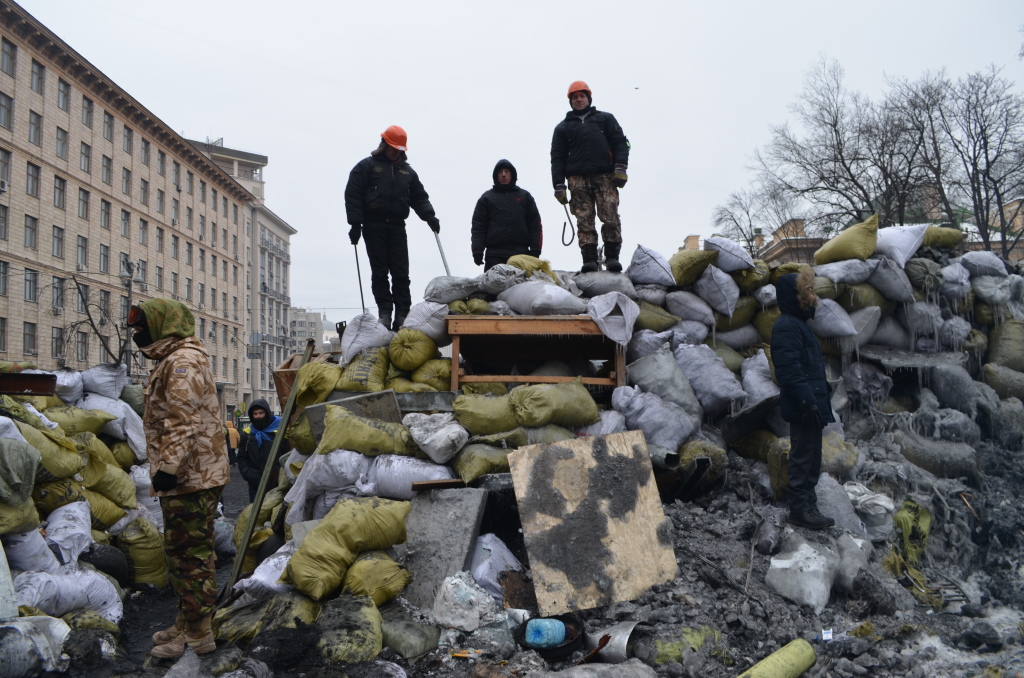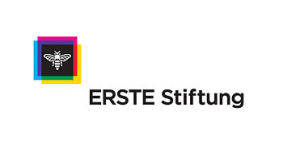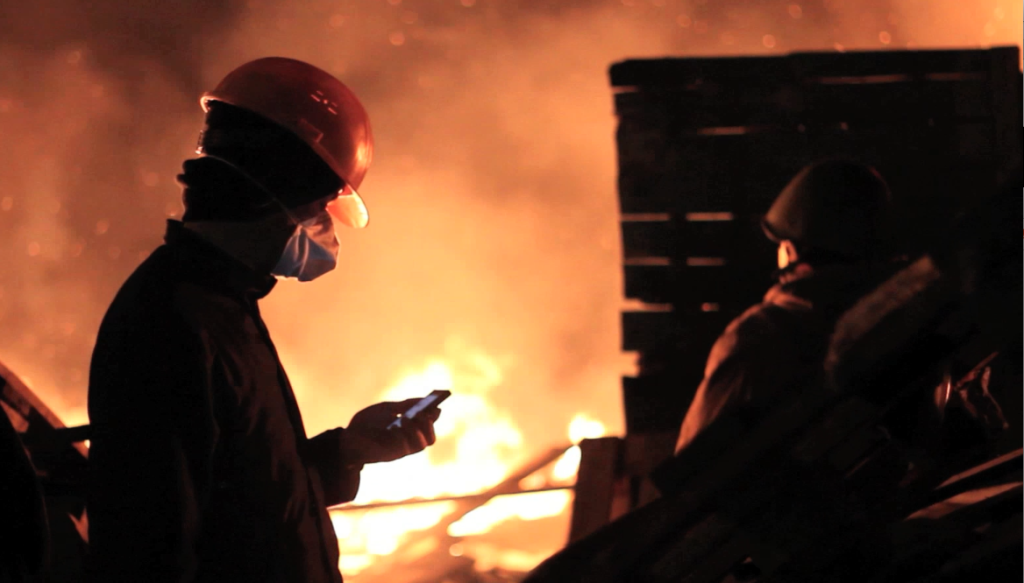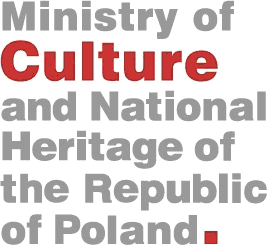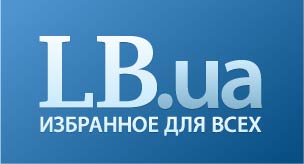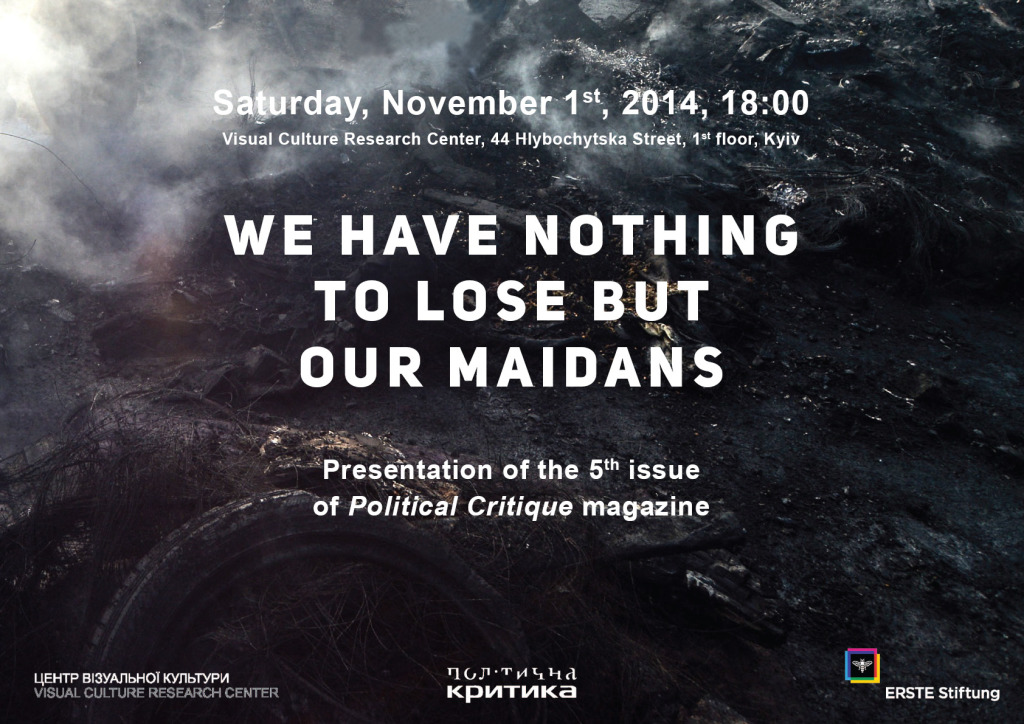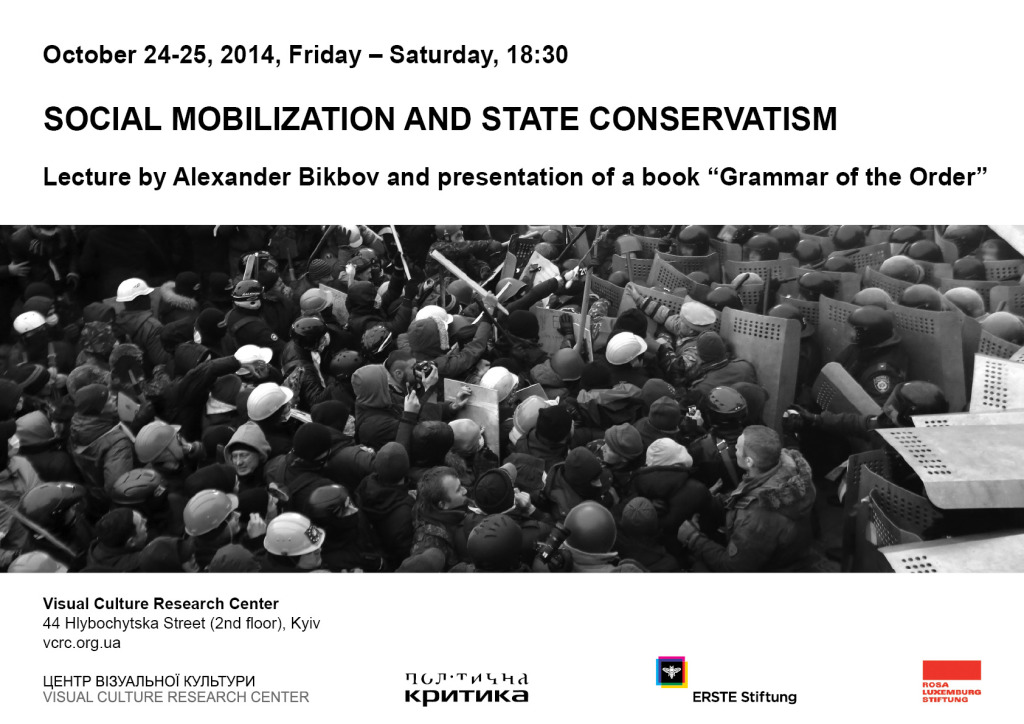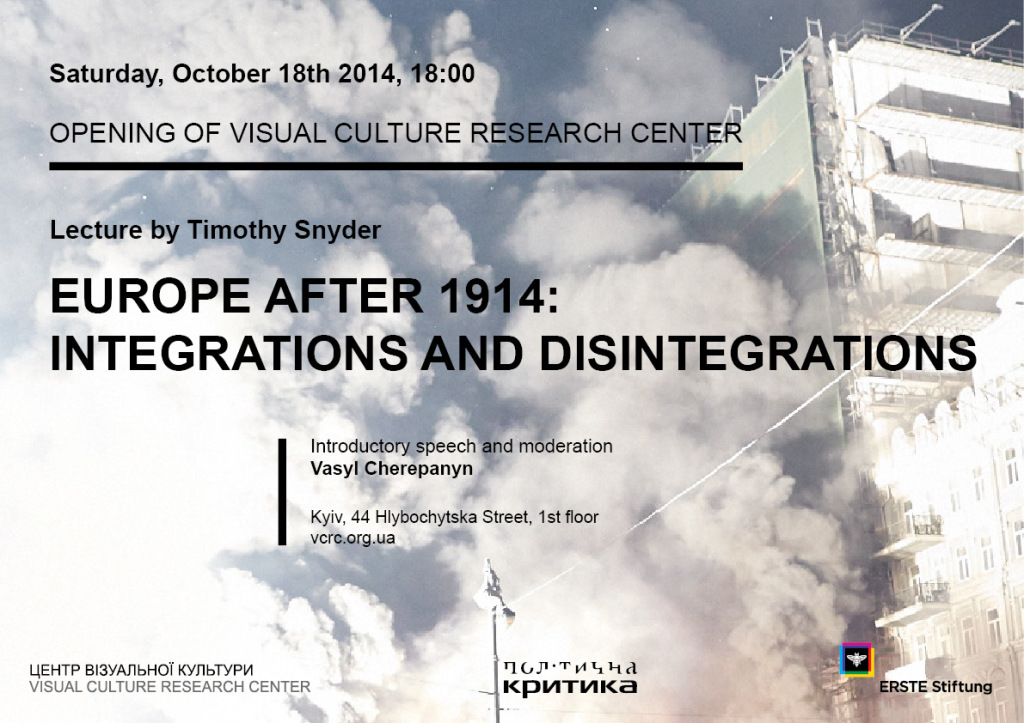Boris Buden. Some Parallels between the Violent Breakup of Yugoslavia and Today’s Ukrainian Crisis
Saturday, November 29th, 16:00 – 21:00
Visual Culture Research Center (44 Hlybochytska Street (1st floor), Kyiv)
Visual Culture Research Center and Political Critique invite you to the workshop and lecture by a writer Boris Buden (Berlin), who will talk about the war and the collapse of Yugoslavia in the 1990s in the light of the current Ukrainian crisis.
On the 29th of December, at 19:00 Boris Buden will deliver a lecture on topic “Europe in Translation: The Limits of a Promise”:
“To fulfill the ideal of unity in its linguistic praxis, the European Union has developed a politics of translation that is based on the principle of equality among all its languages regardless of their cultural importance or size. Yet when it comes to its outer limits this politics turns into its opposite, creating inequalities and violently disrupting existing linguistic continuities. Where is the problem? In the concept of translation!”
Admission is free
On the 29th of November, at 16:00 Boris Buden will also hold a workshop on topic “Some parallels between the violent breakup of Yugoslavia and today’s Ukrainian crisis”:
“History never repeats but sometimes a comparison of two events separated by decades discloses remarkable similarities and continuities: falling apart of a society along cultural divides, mobilization of the past in current struggles, the promise of European integration, irreversibility of violent transformations, etc. What Giorgio Agamben argued about the dissolution of Yugoslavia seems to fully apply to what is taking place today in Ukraine: there will never be a return to normality and restoration of the old social contract. Instead, a violently created state of exception will turn into a permanent condition and even spread all over the globe”.
Recommended readings:
James Graham: The Violent Breakup of Yugoslavia
http://www.historyorb.com/europe/yugoslavia.php
Boris Buden: Saving Private Havel (1999).
Boris Buden: Red Velvet, in Manifesta Journal 18
http://www.manifestajournal.org/issues/situation-never-leaves-our-waking-thoughts-long/red-velvet
To participate in the workshop, you should register by e-mail: vcrc@vcrc.org.ua.
Boris Buden – writer, critic, translator. He received his PhD in Cultural Theory from Humboldt University of Berlin. Member of the Institute for Progressive Cultural Policies (Vienna). His book Zone of Transition: On the End of Post-communism was published in Ukrainian.
The event will take place within the framework of “Between Revolution and War” project with support from Rosa Luxemburg Stiftung (Germany)
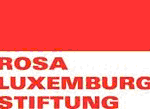
With support from ERSTE Foundation (Austria)
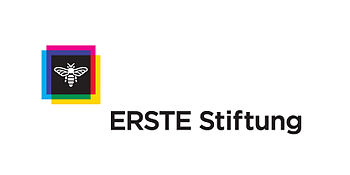
Contacts:
+38 096 492 96 00 (Natalia Neshevets)
www.facebook.com/vcrc.org.ua
vcrc.org.ua
vcrc@vcrc.org.ua
Love Machines: Keti Chukhrov Will Present Her New Film in Kyiv
Thursday, November 27th, 19:00
Visual Culture Research Center (44 Hlybochytska Street (1st floor), Kyiv)
Visual Culture Research Center and Political Critique invite you to the meeting with a poet and playwright Keti Chukhrov (Moscow), who will present her new film Love Machines on Thursday, November 27th at 19:00.
In 2013 Keti Chukhrov created her first film Love Machines based on the same-name play. Keti Chukhrov calls her film, which was shot in the stylistics of television spectacle, “one of the possible stagings of the original play”. The film Love Machines examines a shift of contemporary culture towards post-human condition with its negation of human community, love, solidarity, grief, and other forms of collective sensibility. An artist Arseniy Zhilyaev (Moscow) and poet Dina Gatina (Saint-Petersburg) play main parts in the film.
Keti Chukhrov – poet, playwright, essayist. She has authored numerous plays, as well as publications on philosophy and art theory. Among her books – To Be and to Perform. The Concept of “Theatre” in Philosophical Criticism of Art (2011), Just People (2010). Doctor of Philosophy, Professor at the Department of Art History at the Russian State University for the Humanities. Head of the Research and Information Department at the State Center for Contemporary Art (Moscow).
After the screening a discussion with the author will take place (moderation – Oleksiy Radynski).
Admission is free
ATTENTION! Seats are limited
The event will take place within the framework of “Between Revolution and War” project with support from Rosa Luxemburg Stiftung (Germany)

With support from ERSTE Foundation (Austria)

Contacts:
+38 067 442 23 89 (Oleksiy Radynski)
www.facebook.com/vcrc.org.ua
vcrc.org.ua
vcrc@vcrc.org.ua
Katharina Raabe. End of the “Deep Concern”: Ukrainian Topic in Germany
Saturday, November 22nd, 2014, 18:00
Visual Culture Research Center (44 Hlybochytska Street (1st floor), Kyiv)
End of the “Deep Concern”:
Ukrainian Topic in Germany
Meeting with the editor of Suhrkamp publishing house Katharina Raabe
Visual Culture Research Center and Political Critique invite you to the meeting with German author and publisher Katharina Raabe, which will take place on Saturday, November 22nd at 18:00.
Events of the last year in Ukraine have influenced political consensus of Europe, as well as its intellectual life. In Germany, whose humanitarian politics is largely focused on the Eastern Europe, appeared public intellectuals, who “understand Putin”, on the one hand, and “discoverers of Ukraine” – on the other. In German public sphere “Ukrainian crisis” became not only subject to numerous media debates and political speculations, but also reason for redefining the experience of division, “reunion”, revolution, and civil resistance, particularly, in the context of recent 25th Anniversary of the Fall of the Berlin Wall. How does Ukraine arise in the German intellectual and media discourses? Who are Ukrainian public intellectuals in Germany? Which narratives are dominant in the public sphere?
Katharina Raabe – editor of one of the biggest German publishing houses Suhrkamp. In 2007 Katharina Raabe, who revealed Yuriy Andrukhovych, Serhij Zhadan, Lyubko Deresh, and Katia Petrovska to the German speaking world, received Order of Merit of the Federal Republic of Germany for her promotion of Eastern European literature in Germany. Besides numerous publications of Ukrainian authors, Katharina’s newest book is “Euromaidan: What is at Stake in Ukraine”. At the moment she works on the book “Ukraine, Russia, and Europe”.
Visual Culture Research Center (VCRC) was founded in 2008 for the purpose of creating the interdisciplinary platform for analysis of the Ukrainian post Soviet condition at the intersection of art, knowledge, and politics. Since its inception VCRC has organized over 150 debates, conferences and seminars with the participation of Ukrainian and international researchers, as well as nearly 20 art exhibitions.
Visual Culture Research Center (44 Hlybochytska Street, Kyiv)
Admission is free
Organization partner – Krytyka Polityczna
Visual Culture Research Center works with support from ERSTE Foundation (Austria)
Information partner:
Contacts:
+38097 436 98 99 (Yustyna Kravchuk)
vcrc@vcrc.org.ua
www.facebook.com/vcrc.org.ua
Visual Culture Research Center has Received an Award from European Cultural Foundation
Amsterdam, Wednesday 12 November 2014
2015 ECF Princess Margriet Award goes to courageous cultural initiatives in Greece and Ukraine.
The European Cultural Foundation (ECF) is proud to announce the ECF Princess Margriet Award laureates for 2015 – the Athens Biennale (Athens, Greece) and the Visual Culture Research Center (Kiev, Ukraine).
The Award jury agreed unanimously to give the 2015 edition of the ECF Princess Margriet Award to these two courageous cultural initiatives based in Athens and Kiev. The Award, which will be presented on 31 March 2015 in Brussels, and includes a sum of €25,000 for each laureate.
The new ECF Princess Margriet Award laureates have been chosen for their work building on the public sphere, creating sorely needed open space for artistic imagination.
By choosing to honour these two laureates, ECF is sending a strong signal for the future of independent cultural initiatives in wider Europe that are showing us how transformative culture can be, even in the most challenging political and economic circumstances.
“Their commitment to nurturing a vibrant and inclusive environment involves a broader public in cultural participation and underscores the pivotal role that culture plays in the democratic development of Europe’s communities.” — Katherine Watson, Director ECF
Athens Biennale, Greece
The Athens Biennale has re-imagined the model of the biennale as a space for cultural debate and grassroots organising in contemporary Greece. It has reinvented the art biennale as a structure that enables new forms of solidarity between local and international cultural communities and wider civic engagement. The most recent biennale in 2013 was organised in the format of an Agora, which in ancient times referred to a gathering space that had overlapping social, business and political uses. The biennale took an innovative collective curatorial approach that breaks radically from a consumer-oriented model of exhibition-making. Faced with severe funding, the Athens biennale proves the power of self-organisation and building common ground through culture.
Visual Culture Research Center, Ukraine
The Visual Culture Research Center was founded in the Ukraine capital of Kiev in 2008 as a platform for collaboration between academics, artists and activists. The centre is an interdisciplinary meeting ground for social activism and progressive artistic programming that is making an unprecedented contribution to the shaping of cultural production and debate in Kiev and across the Ukraine and the region. Led by a dynamic and engaged group, the centre succeeds in connecting diverse Ukrainian and international audiences to develop a more complex understanding of how art and critical cultural thinking can equip us with the skills of open-mindedness and a powerful imagination – skills that are so vital to progressive democratic society.
“From Europe’s most fragile borders, facing unforeseeable futures, Visual Culture Research Center and Athens Biennale courageously show us how culture can be a means of solidarity and common ground that create tangible alternatives to the economic and political conflicts of our time.”— Chris Dercon, Jury member, Director, Tate Modern
About the ECF Princesss Margriet Award
Ranging from the late UK cultural theorist Stuart Hall to Italian collective Teatro Valle Occupato, previous laureates of the ECF Princess Margriet Award have inspired viable change in the way citizens engage with Europe as a shared cultural space.
The ECF Princess Margriet Award was initiated by ECF in 2008 and named after the foundation’s former President Princess Margriet of the Netherlands. It was established in partnership with the Dutch Ministry of Education, Culture and Science and the Dutch Ministry of Foreign Affairs.
Note to editors
For more information: http://www.culturalfoundation.eu/pma
About the European Cultural Foundation (ECF)
ECF has been a staunch supporter of culture in Europe for the past 60 years, believing that culture engages people and can inspire them to solicit new approaches to established concepts of democracy. As the organisation celebrates its 60th anniversary this year, it considers the power of culture to be an essential component in the creation of a more open and inclusive Europe. In her capacity as ECF’s President, HRH Princess Laurentien of the Netherlands is an active proponent of ECF’s mission.
http://www.culturalfoundation.eu
Contact
Rosa Koenen | Communications Officer | European Cultural Foundation |
Jan van Goyenkade 5, 1075 HN Amsterdam | +31 20 573 38 68 |
r.koenen@culturalfoundation.eu
A Lecture by Professor of The New School for Social Research Andreas Kalyvas
Friday, November 14th, 2014, 19:00
Visual Culture Research Center
(44 Hlybochytska Street (1st floor), Kyiv)
Moderation – Kateryna Ruban
Visual Culture Research Center and Political Critique invite you to the lecture The Democratic Exception: Resistance and the Making of Popular Sovereignty by a philosopher and political historian Andreas Kalyvas, which will take place on Friday, November 14th, at 19:00.
In his lecture one of the leading researchers of the theory of revolution and history of revolutionary thought – Professor Andreas Kalyvas will trace a birth of popular sovereignty during the struggles against absolute monarchy. Referring to the categories of popular sovereignty, democracy, state, as well as revolutionary break, norm, and exception, researcher suggests a theoretical frame for the analysis of Ukrainian revolutionary experience.
Andreas Kalyvas – philosopher, Professor of Political Science (The New School for Social Research, New York), political theorist and historian of political thought, author of the book Democracy and the Politics of the Extraordinary: Max Weber, Carl Schmitt, Hannah Arendt (2008). In his research he focuses on the problems of popular sovereignty, radical revolutionary break, and constitution making, emergency rule, relations between democracy and constitutionalism, norm and exception in political theory and practice.
Kateryna Ruban – PhD candidate at New York University, member of Visual Culture Research Center, researcher of the Soviet history.
Andreas Kalyvas studies, how the exceptional right of the many to disobey, resist, depose, or kill their (tyrannical) rulers, that is, to break away from the instituted legality, was derived from their sovereign power to determine and establish the political forms of their common life. On the basis of historical reconstruction of the processes, which developed in Europe during the 16th century, Kalyvas defines popular sovereignty as the supreme power to initiate ruptures by instituting forms of government, abolishing, altering, and reforming them. Finally, the author explores the implications of this insurgent doctrine of sovereignty for a theory of the democratic exception against the paradigm of statocentric sovereignty.
Visual Culture Research Center (VCRC) was founded in 2008 for the purpose of creating the interdisciplinary platform for analysis of the Ukrainian post-Soviet condition at the intersection of art, knowledge, and politics. Since its inception VCRC has organized over 150 debates, conferences and seminars with the participation of Ukrainian and international researchers, as well as nearly 20 art exhibitions.
Visual Culture Research Center (44 Hlybochytska Street, 1st floor, Kyiv)
Working language – English
Admission is free
The lecture will take place within the framework of “Between Revolution and War” project with support from Rosa Luxemburg Stiftung (Germany).
Organization partner: Krytyka Polityczna (Poland)
With support from: ERSTE Foundation (Austria)
Information partner:
Contacts:
+38 096 492 96 00 (Natalia Neshevets)
vcrc.org.ua
vcrc@vcrc.org.ua
www.facebook.com/vcrc.org.ua
Peace is War. Screening of Films by Mykola Ridnyi, Serhiy Popov, and Oleksiy Radynski
Friday – Saturday, November 7th – 8th, 2014, 19:00
Visual Culture Research Center (44 Hlybochytska Street (1st floor), Kyiv)
On Friday, November 7th at 19:00 the screening of films Fortress and Common Places by Mykola Ridnyi, as well as Souveneir by Serhiy Popov will take place at Visual Culture Research Center. In his film Fortress Mykola Ridnyi juxtaposes documentary shots made during the uprising on Maidan in winter 2013 – 2014 and in Yanukovych’s residence in Mezhyhirya with texts about European Middle Ages. In such a way, the author draws a parallel between contemporary post Soviet neo-liberalism and European feudal monarchy system. Common Places by Mykola Ridnyi is a multichannel video, which shows huge Eastern European city standing on the verge of war. The film analyses, how social and political turmoil in the country changes the perception of public space. Souvenir by Serhiy Popov is a documentation of events around the demolished Lenin monument in Kyiv and analyses the mechanisms of collective destruction.
After the screening the discussion with the participation of authors will take place. Moderation – Lesia Kulchynska.
On Saturday, November 8th at 19:00 the screening of films Integration, Referendum, and Ukraine Goes to War by Oleksiy Radynski will take place. The film Integration is the result of months-long observation of public manifestations during the uprising on Maidan. Reproducing a gradual escalation of conflict, the film questions the connection between democracy and violence, as well as political action and religious ritual. This short film covers the time period between the first violent clashes in Kyiv in early December 2013 and the militarization of society as a result of Russian aggression in March 2014. Short video Referendum is a concrete personal story filmed in Simferopol during the annexation of Crimea, which refers to the historical context of Russian invasion. Video Ukraine Goes to War was shot in Donbas in March 2014, and shows the early stage of civil conflict, which has not yet developed into a full-scale war.
After the screening the discussion with the participation of author will take place. Moderation – Vasyl Cherepanyn.
Information about authors:
Serhiy Popov – artist, member of SOSka Group.
Mykola Ridnyi – artist, curator, member of SOSka Group. In 2013 he represented Ukraine at Venice Biennial. In 2014 his personal exhibition Shelter took place at Visual Culture Research Center.
Oleksiy Radynski – researcher, documentary film maker. He is a member of Visual Culture Research Center and editor of Political Critique magazine.
Screenings take place in the framework of “Between Revolution and War” project with support from Rosa Luxemburg Stiftung (Germany).

Visual Culture Research Center (VCRC) was founded in 2008 for the purpose of creating the interdisciplinary platform for analysis of the Ukrainian post Soviet condition at the intersection of art, knowledge, and politics. Since its inception VCRC has organized over 150 debates, conferences and seminars with the participation of Ukrainian and international researchers, as well as nearly 20 art exhibitions.
Visual Culture Research Center (44 Hlybochytska Street, Kyiv)
Events will take place with support from: Krytyka Polityczna (Poland), ERSTE Foundation (Austria).

Contacts:
+38 096 492 96 00 (Nataliya Neshevets), +38 093 460 68 81 (Oksana Briukhovetska)
vcrc@vcrc.org.ua
www.facebook.com/vcrc.org.ua
Lockout. Opening of the Exhibition of Eastern European Critical Art
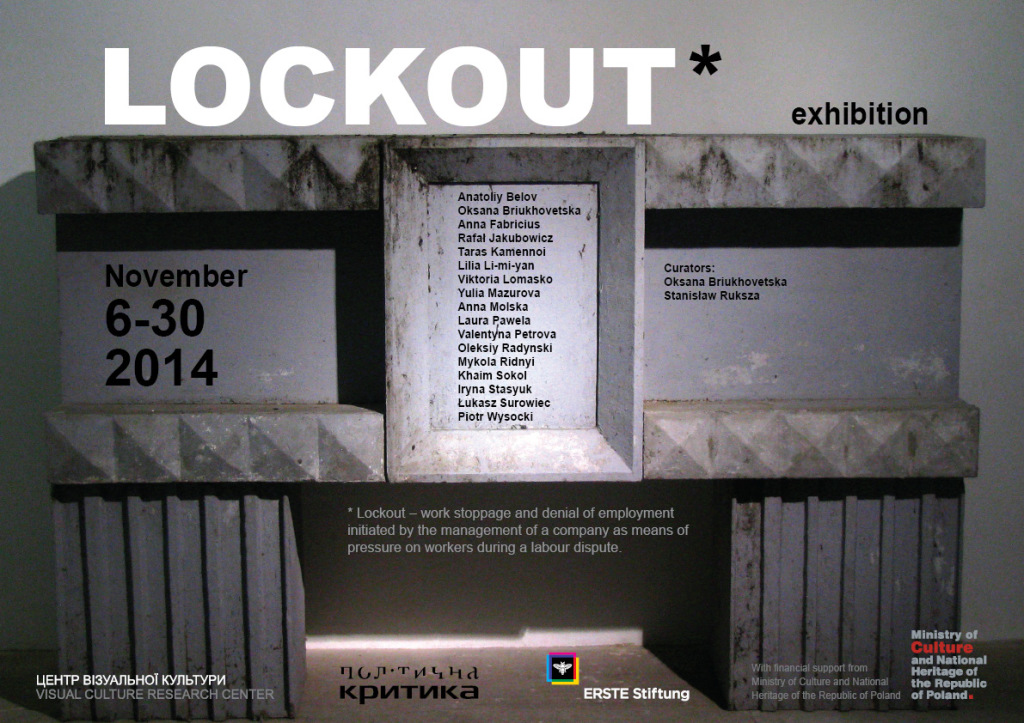
Thursday, November 6th 2014, 19:00
44 Hlybochytska Street (1st floor), Kyiv
Lockout. Opening of the Exhibition of Eastern European Critical Art
Visual Culture Research Center invites you to the opening of the exhibition Lockout, which will take place on Thursday, November 6th at 19:00. Curators: Oksana Briukhovetska (Visual Culture Research Center, Ukraine) and Stanisław Ruksza (Center for Contemporary Art Kronika, Poland).
Exhibition’s title Lockout refers to the work stoppage at the enterprise initiated by the employer – practice, which is forbidden in many countries but Ukraine. Curators consider this phenomenon a metaphor of the social situation in post-socialist world. Works, presented at the exhibition, reveal the hidden, or invisible, reality of labour as one of the most routine and important aspects of human life. Exhibition Lockout includes critical art works from Poland, Russia, Ukraine, and Hungary.
Exhibition participants: Anatoliy Belov (Ukraine), Oksana Briukhovetska (Ukraine), Anna Fabricius (Hungary), Rafał Jakubowicz (Poland), Taras Kamennoy (Ukraine), Lilia Li-mi-yan (Russia), Viktoria Lomasko (Russia), Yulia Mazurova (Russia), Anna Molska (Poland), Laura Pawela (Poland), Valentyna Petrova (Ukraine), Oleksiy Radynski (Ukraine), Mykola Ridnyi (Ukraine), Khaim Sokol (Russia), Iryna Stasyuk (Ukraine), Łukasz Surowiec (Poland), Piotr Wysocki (Poland).
Curators of the exhibition Oksana Briukhovetska and Stanisław Ruksza: “We can see how in Eastern Europe local phenomena correspond to the problems of the neighboring countries. Working with those, who are expelled from the world of wealth, artists make them visible. And this may become the first step towards important changes”.
Within the framework of exhibition meetings with its participants and film screenings will take place:
November 7th, 19:00 – screening of Fortress, Common Places by Mykola Ridnyi.
November 8th, 19:00 – screening of Integration, Referendum, Ukraine Goes To War by Oleksiy Radynski.
Exhibition is open from the 7th until the 30th of November, from 12:00 until 20:00, every day, except Monday.
Information about curators:
Oksana Briukhovetska – artist, curator at Visual Culture Research Center. Graduate of the National Academy of Fine Arts and Architecture, Kyiv. Curator of the exhibitions Childhood. Uncensored and Ukrainian Body at Visual Culture Research Center.
Stanisław Ruksza – curator, art historian. Director of the Center for Contemporary Art Kronika (Bytom, Poland). Author of the numerous publications about contemporary art, coordinator of Political Critique club in Śląsk.
Visual Culture Research Center (VCRC) was founded in 2008 for the purpose of creating the interdisciplinary platform for analysis of the Ukrainian post-Soviet condition at the intersection of art, knowledge, and politics. Since its inception VCRC has organized over 150 debates, conferences and seminars with the participation of Ukrainian and international researchers, as well as nearly 20 art exhibitions.
Visual Culture Research Center (44 Hlybochytska Street, 1st floor, Kyiv)
Events will take place with support from: Krytyka Polityczna (Poland), ERSTE Foundation (Austria)
Exhibition Lockout is co-organized by Visual Culture Research Center and Center for Contemporary Art Kronika (Bytom, Poland) with support from Ministry of Culture and National Heritage of the Republic of Poland.
Information partners:
Contacts:
+38 096 492 96 00 (Nataliya Neshevets), +38 093 460 68 81 (Oksana Briukhovetska)
vcrc@vcrc.org.ua
www.facebook.com/vcrc.org.ua
WE HAVE NOTHING TO LOSE BUT OUR MAIDANS
Saturday, November 1st, 2014, 18:00
44 Hlybochytska Street (1st floor), Kyiv
WE HAVE NOTHING TO LOSE
BUT OUR MAIDANS
Presentation of the 5th issue of Political Critique magazine
Visual Culture Research Center invites you to the presentation of the 5th issue of Political Critique entitled “We Have Nothing To Lose But Our Maidans”, which will take place on Saturday, November 1st at 18:00.
In spite of all the written texts and produced images, we are still far from the complete understanding of the event of Maidan. The 5th issue of Political Critique represents the phenomenon of Maidan, which can be considered as a “visual revolution”, with its own visual means. During the events on Maidan political and revolutionary power of visual image was consistently realized. This edition of Political Critique analyses visual image as the revolutionary instrument on Maidan.
Besides texts the issue includes photos, many of which are being published for the first time, particularly the works by Oleksandr Burlaka, Maksym Dondyuk, Oleksandr Kozachenko, Yevgen Kotenko, Sasha Kurmaz, Viktor Marushchenko, Ivan Melnychuk, Sergiy Morgunov, Tomáš Rafa, Yulia Serdyukova, and Olga Yakymovych. The publication also contains artistic projects related to the issues of political violence: “Controlled incidents” by Mykyta Kadan and “Shelter” by Mykola Ridnyi. Textual part of the magazine consists of articles, which look into Maidan from political, social, visual, and urban perspectives.
The presentation of the issue will take place with the participation of its editors and authors: Oksana Briukhovetska, Vasyl Cherepanyn, Yustyna Kravchuk, Lesia Kulchynska, Oleksiy Radynski. Artists and photographers presented in the issue are also invited.
Political Critique is an international publishing project of the same-name intellectual community in Eastern Europe. Ukrainian edition of Political Critique is aimed at the promotion of critical thinking towards political, social, and cultural processes in Ukraine.
Visual Culture Research Center (VCRC) was founded in 2008 for the purpose of creating the interdisciplinary platform for analysis of the Ukrainian post-Soviet condition at the intersection of art, knowledge, and politics. Since its inception VCRC has organized over 150 debates, conferences and seminars with the participation of Ukrainian and international researchers, as well as nearly 20 art exhibitions.
Visual Culture Research Center (44 Hlybochytska Street, 1st floor, Kyiv)
vcrc.org.ua
krytykapolityczna.pl
politicalcritique.org
Admission is free
ATTENTION! Seats are limited
Events will take place with support from: Krytyka Polityczna (Poland), ERSTE Foundation (Austria)
Media partner:
Contacts:
+38 067 442 23 89 (Oleksiy Radynski)
vcrc@vcrc.org.ua
www.facebook.com/vcrc.org.ua
Alexandr Bikbov “Social Mobilization and State Conservatism”
October 24-25, Friday – Saturday
(44 Hlybochytska Street (2nd floor), Kyiv)
Social Mobilization and State Conservatism
Lecture by Alexander Bikbov and presentation of a book “Grammar of the Order”
Visual Culture Research Center invites you to the lecture “Social Mobilization and State Conservatism” by sociologist Alexander Bikbov, and also to the presentation of his book “Grammar of the Order”. In his talks he will analyze the latest civil protests in Russia, taking into consideration analogous events in Spain, Egypt, USA, Greece, and Brazil, as well as present new research discipline – historical sociology of concepts.
On Friday, October 24 at 18:30 Alexander Bikbov will take part in the presentation of the book “Grammar of the Order” (Moscow, 2014). This book is a result of longtime research of the Soviet and Russian societies and a fundamental introduction to the historical sociology of concepts. The author explains Russian social order of the last 20 years through the social cooperation and struggle, which evolve around such concepts as “middle class”, “democracy”, “Russian science”, “Russian nation” etc. The research also deals with Russian protest actions, which started in 2011. Moderation of the presentation – Lesia Kulchynska.
On Saturday, October 25 at 18:30 Alexander Bikbov will deliver a lecture “Social Mobilization and State Conservatism”. Bikbov considers civil protests of 2011 – 2013 in the context of interrelation between violent and non-violent movements: “Forms and political consequences of civil violence, which have called into question the state monopoly for violence, are still poorly analyzed. Even less obvious is a connection between the structure of the civil protest and state violence, which is being implemented not only in the form of “antiterrorist” laws and police prosecution for activism, but also in the incentive form of working conditions, public funding etc. When in European and Latin American protests the critique of state neo-liberalism was clearly articulated, in post-Soviet countries this connection is less visible. However, Russian and maybe Ukrainian experience give many reasons to reveal it”. Moderation of the discussion – Vasyl Cherepanyn.
Alexander Bikbov – sociologist, researcher, editor of Logos magazine, associate member of Centre Maurice-Halbwachs (Paris), deputy director of Centre for Contemporary Philosophy and Social Sciences in Moscow State University. Scientific coordinator of the Independent Research Initiative for the study of mass protest movements in Russia. Personal website: http://a.bikbov.ru/.
Visual Culture Research Center (44 Hlybochytska Street, Kyiv)
Admission is free
ATTENTION! Seats are limited
Events will take place with support from: Krytyka Polityczna (Poland), ERSTE Foundation (Austria), Rosa Luxemburg Stiftung (Germany).
Contacts:
096 492 96 00 (Nataliya Neshevets)
vcrc@vcrc.org.ua
www.facebook.com/vcrc.org.ua
Opening of Visual Culture Research Center: Lecture by Timothy Snyder
Saturday, October 18th, 18:00
Visual Culture Research Center (44 Hlybochytska Street, Kyiv)
Visual Culture Research Center invites you to the opening of our new premises, which will be held on Saturday, October 18th at the address 44 Hlybochytska Street (1st floor). During the opening, Professor Timothy Snyder (Yale University) will deliver a lecture. Vasyl Cherepanyn, head of Visual Culture Research Center, will make an introductory speech and will also moderate a discussion with the participation of Timothy Snyder.
Visual Culture Research Center (VCRC) was founded in 2008 for the purpose of creating the interdisciplinary platform for analysis of the Ukrainian post Soviet condition at the intersection of art, knowledge, and politics. Since its inception VCRC has organized over 150 debates, conferences and seminars with the participation of Ukrainian and international researchers, as well as nearly 20 art exhibitions.
American historian and publicist Timothy Snyder is one of the major researchers of Central and Eastern European history, as well as the Holocaust. In his lecture “Europe after 1914: Integrations and Disintegrations” Timothy Snyder will consider historical origins of the 2013 – 14 Ukrainian crisis.
Timothy Snyder: “Contemporary European history can be understood as a series of integrations and disintegrations, continuing before our eyes in the present day. 1914 was not the end of an old Europe, but the continuation of a process of decolonization within Europe itself. 1939 was not a collapse of civilization, but the crowning moment of Soviet and Nazi attempts to colonize Europe from within. The project of European integration known as the EU succeeded as traditional maritime colonialism failed. The revolutions of 1989 allowed European states with different histories of colonialism and decolonialism to join in a single project. Today the EU stands challenged by a deliberate policy of disintegration known as Eurasia; as so many times before, Ukraine is in the middle”.
Timothy Snyder is a professor of history at Yale University, author of numerous works in Central and Eastern European history. He writes for International Herald Tribune, New York Review of Books, The New Republic, Eurozine and other periodicals. His books Bloodlands: Europe Between Hitler and Stalin, The Red Prince: The Secret Lives of A Habsburg Archduke, and Ukrainian History, Russian Politics, European Future were published in Ukrainian. In 2014 Timothy Snyder has written numerous polemical texts about political and military crisis in Ukraine.
Vasyl Cherepanyn is the director of the Visual Culture Research Center, teacher at the Cultural Studies Department at National University of “Kyiv-Mohyla Academy”, PhD in art history. He is an editor of the Ukrainian version of Political Critique magazine.
Working language – English
Admission is free
ATTENTION! Seats are limited
Contacts:
+380674422389 (Oleksiy Radynski)
vcrc@vcrc.org.ua
www.facebook.com/vcrc.org.ua
Visual Culture Research Center is supported by
Erste Foundation and Political Critique

